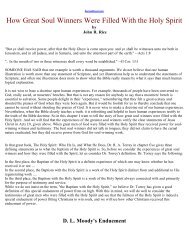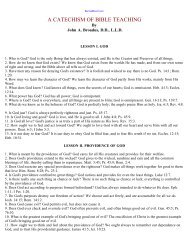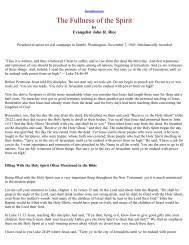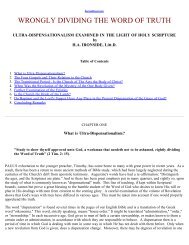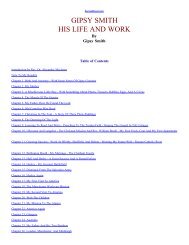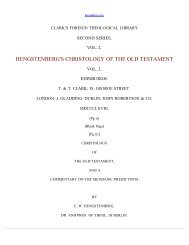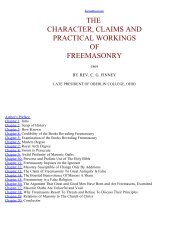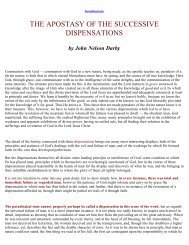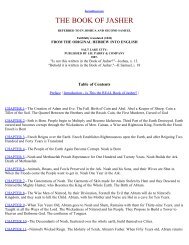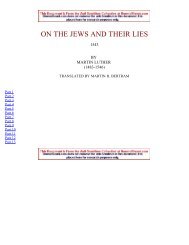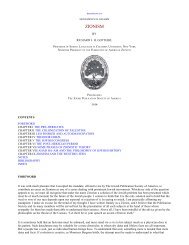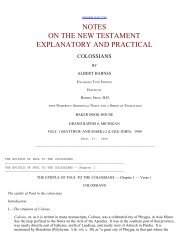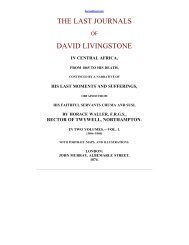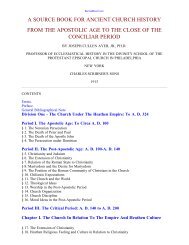Legends of Babylon and Egypt in Relation to Hebrew Tradition.pdf
Legends of Babylon and Egypt in Relation to Hebrew Tradition.pdf
Legends of Babylon and Egypt in Relation to Hebrew Tradition.pdf
You also want an ePaper? Increase the reach of your titles
YUMPU automatically turns print PDFs into web optimized ePapers that Google loves.
staff <strong>of</strong> the bread transgression! there<strong>of</strong>, <strong>and</strong> send /fam<strong>in</strong>e/ Be merciful, so that (all) be not upon it, <strong>and</strong> cut <strong>of</strong>f from it<br />
destroyed! Have patience, so man <strong>and</strong> beast; though these that (all) be not [cut <strong>of</strong>f]! three men, Noah, Daniel, <strong>and</strong><br />
Instead <strong>of</strong> caus<strong>in</strong>g a flood, Job, were <strong>in</strong> it, they should Let /lions/[1] come <strong>and</strong> dim<strong>in</strong>ish deliver but their own souls by<br />
mank<strong>in</strong>d! their righteousness, saith the Instead <strong>of</strong> caus<strong>in</strong>g a flood, Lord God. Let /leopards/[1] come <strong>and</strong> If I cause<br />
/noisome beasts/ <strong>to</strong> dim<strong>in</strong>ish mank<strong>in</strong>d! pass through the l<strong>and</strong>, <strong>and</strong> Instead <strong>of</strong> caus<strong>in</strong>g a flood, they spoil it, so that it be<br />
Let /fam<strong>in</strong>e/ be caused <strong>and</strong> let it desolate, that no man may pass smite the l<strong>and</strong>! through because <strong>of</strong> the beasts; Instead<br />
<strong>of</strong> caus<strong>in</strong>g a flood, though these three men were <strong>in</strong> Let the /Plague-god/ come <strong>and</strong> it, as I live, saith the Lord [slay]<br />
mank<strong>in</strong>d! God, they shall deliver neither sons nor daughters; they only shall be delivered, but the l<strong>and</strong> shall be<br />
desolate. Or if I br<strong>in</strong>g a /sword/ upon that l<strong>and</strong>, <strong>and</strong> say, Sword, go through the l<strong>and</strong>; so that I cut <strong>of</strong>f from it man <strong>and</strong><br />
beast; though these three men were <strong>in</strong> it, as I live, saith the Lord God, they shall deliver neither sons nor daughters, but<br />
they only shall be delivered themselves. Or if I send a /pestilence/ <strong>in</strong><strong>to</strong> that l<strong>and</strong>, <strong>and</strong> pour out my fury upon it <strong>in</strong><br />
blood, <strong>to</strong> cut <strong>of</strong>f from it man <strong>and</strong> beast; though Noah, Daniel, <strong>and</strong> Job, were <strong>in</strong> it, as I live, saith the Lord God, they<br />
shall deliver neither son nor daughter; they shall but deliver their own souls by their righteousness.<br />
[1] Both <strong>Babylon</strong>ian words are <strong>in</strong> the s<strong>in</strong>gular, but probably used collectively, as is the case with their <strong>Hebrew</strong><br />
equivalent <strong>in</strong> Ezek. xiv. 15.<br />
It will be seen that, <strong>of</strong> the four k<strong>in</strong>ds <strong>of</strong> div<strong>in</strong>e punishment mentioned, three accurately correspond <strong>in</strong> both<br />
compositions. Fam<strong>in</strong>e <strong>and</strong> pestilence occur <strong>in</strong> both, while the lions <strong>and</strong> leopards <strong>of</strong> the Epic f<strong>in</strong>d an equivalent <strong>in</strong><br />
"noisome beasts". The sword is not referred <strong>to</strong> <strong>in</strong> the Epic, but as this had already threatened Jerusalem at the time <strong>of</strong><br />
the prophecy's utterance its <strong>in</strong>clusion by Ezekiel was <strong>in</strong>evitable. Moreover, the fact that Noah should be named <strong>in</strong> the<br />
refra<strong>in</strong>, as the first <strong>of</strong> the three proverbial examples <strong>of</strong> righteousness, shows that Ezekiel had the Deluge <strong>in</strong> his m<strong>in</strong>d,<br />
<strong>and</strong> <strong>in</strong>creases the significance <strong>of</strong> the underly<strong>in</strong>g parallel between his argument <strong>and</strong> that <strong>of</strong> the <strong>Babylon</strong>ian poet.[1] It<br />
may be added that Ezekiel has thrown his prophecy <strong>in</strong><strong>to</strong> poetical form, <strong>and</strong> the metre <strong>of</strong> the two passages <strong>in</strong> the<br />
<strong>Babylon</strong>ian <strong>and</strong> <strong>Hebrew</strong> is, as Dr. Daiches po<strong>in</strong>ts out, not dissimilar.<br />
[1] This suggestion is <strong>in</strong> some measure confirmed by the /Biblical Antiquities <strong>of</strong> Philo/, ascribed by Dr. James <strong>to</strong> the<br />
clos<strong>in</strong>g years <strong>of</strong> the first century A.D.; for its writer, <strong>in</strong> his account <strong>of</strong> the Flood, has actually used Ezek. xiv. 12 ff. <strong>in</strong><br />
order <strong>to</strong> elaborate the div<strong>in</strong>e speech <strong>in</strong> Gen. viii. 21 f. This will be seen from the follow<strong>in</strong>g extract, <strong>in</strong> which the<br />
passage <strong>in</strong>terpolated between verses 21 <strong>and</strong> 22 <strong>of</strong> Gen. viii is enclosed with<strong>in</strong> brackets: "And God said: I will not aga<strong>in</strong><br />
curse the earth for man's sake, for the guise <strong>of</strong> man's heart hath left <strong>of</strong>f (sic) from his youth. And therefore I will not<br />
aga<strong>in</strong> destroy <strong>to</strong>gether all liv<strong>in</strong>g as I have done. [But it shall be, when the dwellers upon earth have s<strong>in</strong>ned, I will judge<br />
them by /fam<strong>in</strong>e/ or by the /sword/ or by fire or by /pestilence/ (lit. death), <strong>and</strong> there shall be earthquakes, <strong>and</strong> they<br />
shall be scattered <strong>in</strong><strong>to</strong> places not <strong>in</strong>habited (or, the places <strong>of</strong> their habitation shall be scattered). But I will not aga<strong>in</strong><br />
spoil the earth with the water <strong>of</strong> a flood, <strong>and</strong>] <strong>in</strong> all the days <strong>of</strong> the earth seed time <strong>and</strong> harvest, cold <strong>and</strong> heat, summer<br />
<strong>and</strong> autumn, day <strong>and</strong> night shall not cease . . ."; see James, /The Biblical Antiquities <strong>of</strong> Philo/, p. 81, iii. 9. Here wild<br />
beasts are omitted, <strong>and</strong> fire, earthquakes, <strong>and</strong> exile are added; but fam<strong>in</strong>e, sword, <strong>and</strong> pestilence are prom<strong>in</strong>ent, <strong>and</strong> the<br />
whole passage is clearly suggested by Ezekiel. As a result <strong>of</strong> the comb<strong>in</strong>ation, we have <strong>in</strong> the /Biblical Antiquities/ a<br />
complete parallel <strong>to</strong> the passage <strong>in</strong> the Gilgamesh Epic.<br />
It may <strong>of</strong> course be urged that wild beasts, fam<strong>in</strong>e, <strong>and</strong> pestilence are such obvious forms <strong>of</strong> div<strong>in</strong>e punishment that<br />
their enumeration by both writers is merely due <strong>to</strong> chance. But the parallelism should be considered with the other<br />
possible po<strong>in</strong>ts <strong>of</strong> connexion, namely, the fact that each writer is deal<strong>in</strong>g with discrim<strong>in</strong>ation <strong>in</strong> div<strong>in</strong>e punishments <strong>of</strong><br />
a wholesale character, <strong>and</strong> that while the one is <strong>in</strong>spired by the <strong>Babylon</strong>ian tradition <strong>of</strong> the Flood, the other takes the<br />
hero <strong>of</strong> the <strong>Hebrew</strong> Flood s<strong>to</strong>ry as the first <strong>of</strong> his selected types <strong>of</strong> righteousness. It is possible that Ezekiel may have<br />
heard the <strong>Babylon</strong>ian Version recited after his arrival on the Chebar. And assum<strong>in</strong>g that some form <strong>of</strong> the s<strong>to</strong>ry had<br />
long been a cherished tradition <strong>of</strong> the <strong>Hebrew</strong>s themselves, we could underst<strong>and</strong> his <strong>in</strong>tense <strong>in</strong>terest <strong>in</strong> f<strong>in</strong>d<strong>in</strong>g it<br />
confirmed by the <strong>Babylon</strong>ians, who would show him where their Flood had taken place. To a man <strong>of</strong> his temperament,<br />
the one passage <strong>in</strong> the <strong>Babylon</strong>ian poem that would have made a special appeal would have been that quoted above,<br />
where the poet urges that div<strong>in</strong>e vengeance should be comb<strong>in</strong>ed with mercy, <strong>and</strong> that all, righteous <strong>and</strong> wicked alike,<br />
should not aga<strong>in</strong> be destroyed. A problem cont<strong>in</strong>ually <strong>in</strong> Ezekiel's thoughts was this very question <strong>of</strong> wholesale div<strong>in</strong>e<br />
punishment, as exemplified <strong>in</strong> the case <strong>of</strong> Judah; <strong>and</strong> it would not have been unlikely that the literary structure <strong>of</strong> the<br />
<strong>Babylon</strong>ian extract may have <strong>in</strong>fluenced the form <strong>in</strong> which he embodied his own conclusions.



